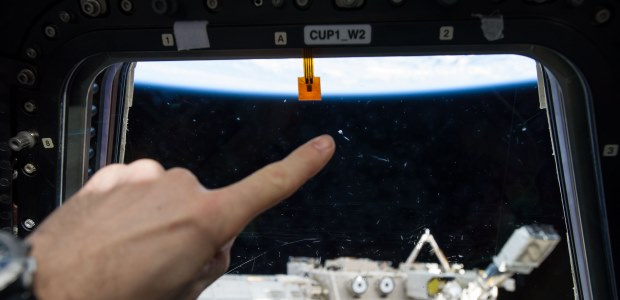
Debris Sensor Among Research Projects Set for Space Station Delivery
One investigation being delivered in the next resupply mission will help researchers understand how to prevent muscle breakdown in the absence of gravity.
The next resupply mission to the International Space Station will include a sensor to measure the orbital debris environment around the station for two to three years and a project to test a drug compound and drug delivery system intended to combat muscular breakdown in space or other times of disuse, NASA reports. The mission will employ SpaceX's Dragon spacecraft and will launch from Cape Canaveral Air Force Station, Fla., no earlier than Dec. 4.
The mission will bring crew supplies, equipment, and scientific research to crew members living and working aboard the station, according to a report on nasa.gov that was written by Jenny Howard of the International Space Station Program Science Office.
It says the research materials that will be delivered to the station include:
Optical Fiber Production in Microgravity, a U.S. National Lab investigation sponsored by the Center for the Advancement of Science in Space, will demonstrate the benefits of manufacturing fiber optic filaments in a microgravity environment. "This investigation will attempt to pull fiber optic wire from ZBLAN, a heavy metal fluoride glass commonly used to make fiber optic glass. When ZBLAN is solidified on Earth, its atomic structure tends to form into crystals. Research indicates that ZBLAN fiber pulled in microgravity may not crystalize as much, giving it better optical qualities than the silica used in most fiber optic wire. Results from this investigation could lead to the production of higher-quality fiber optic products both in space and on Earth," the report states.
The Space Debris Sensor, which will be mounted on the outside of the station. It will provide "near-real-time impact detection and recording," she reports, adding that the research could help lower the risk to humans and critical hardware from orbital debris.
An investigation that involves the design and assembly of 3-D structures from small particles suspended in a fluid medium. "Future space exploration may use self-assembly and self-replication to make materials and devices that can repair themselves on long duration missions," the report states.
The Rodent Research-6 investigation that will examine a system designed to combat muscle breakdown. "The implanted drug delivery chip will administer a compound meant to maintain muscle in a variety of disuse conditions, including microgravity. The results from the RR-6 investigations will not only help researchers to understand how to better maintain a healthy body structure in the absence of gravity, but will also increase our understanding of muscle-related diseases, disorders and injuries," it says.
The NASA photo used with this story shows the mark left on a window of the International Space Station's Cupola by a micro meteor orbital debris strike.